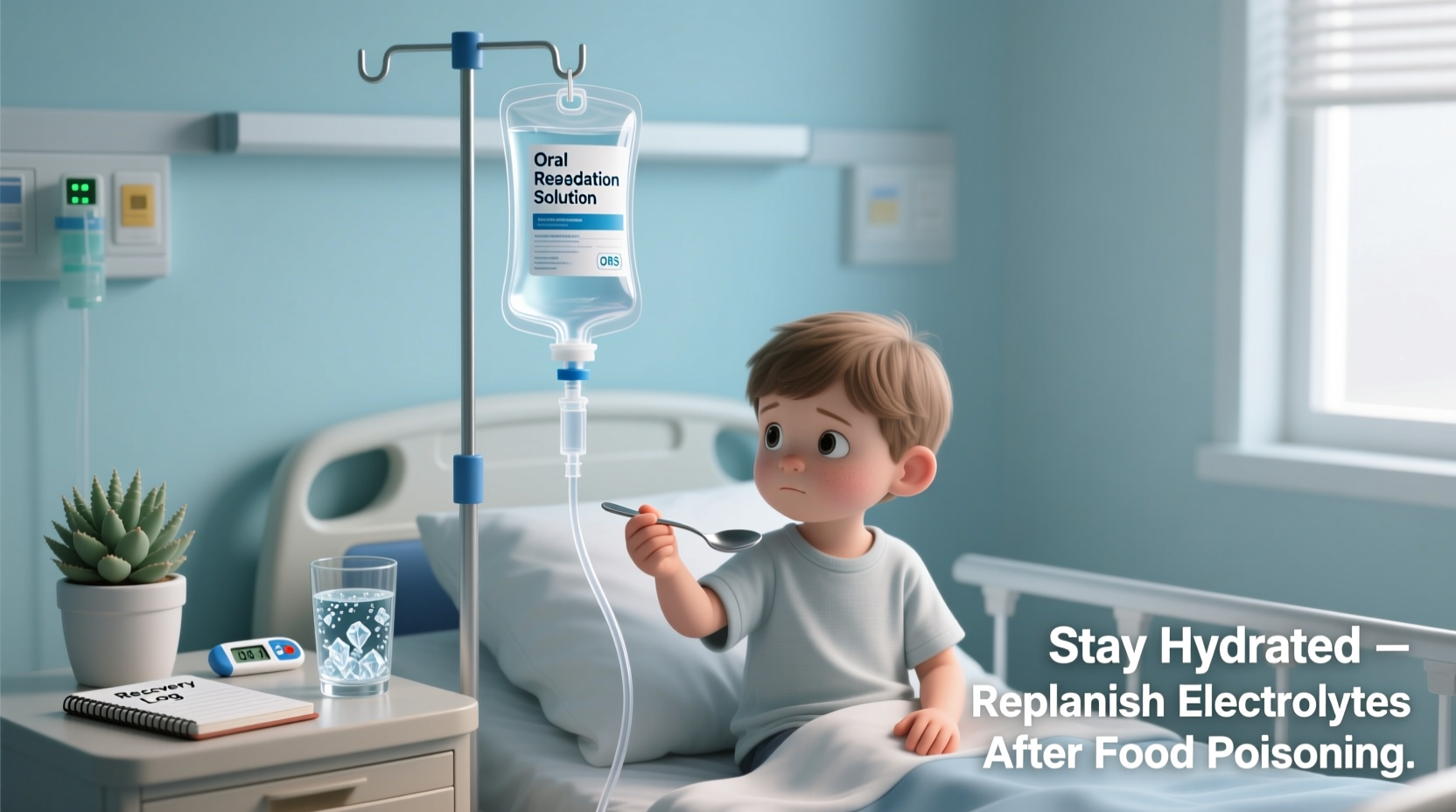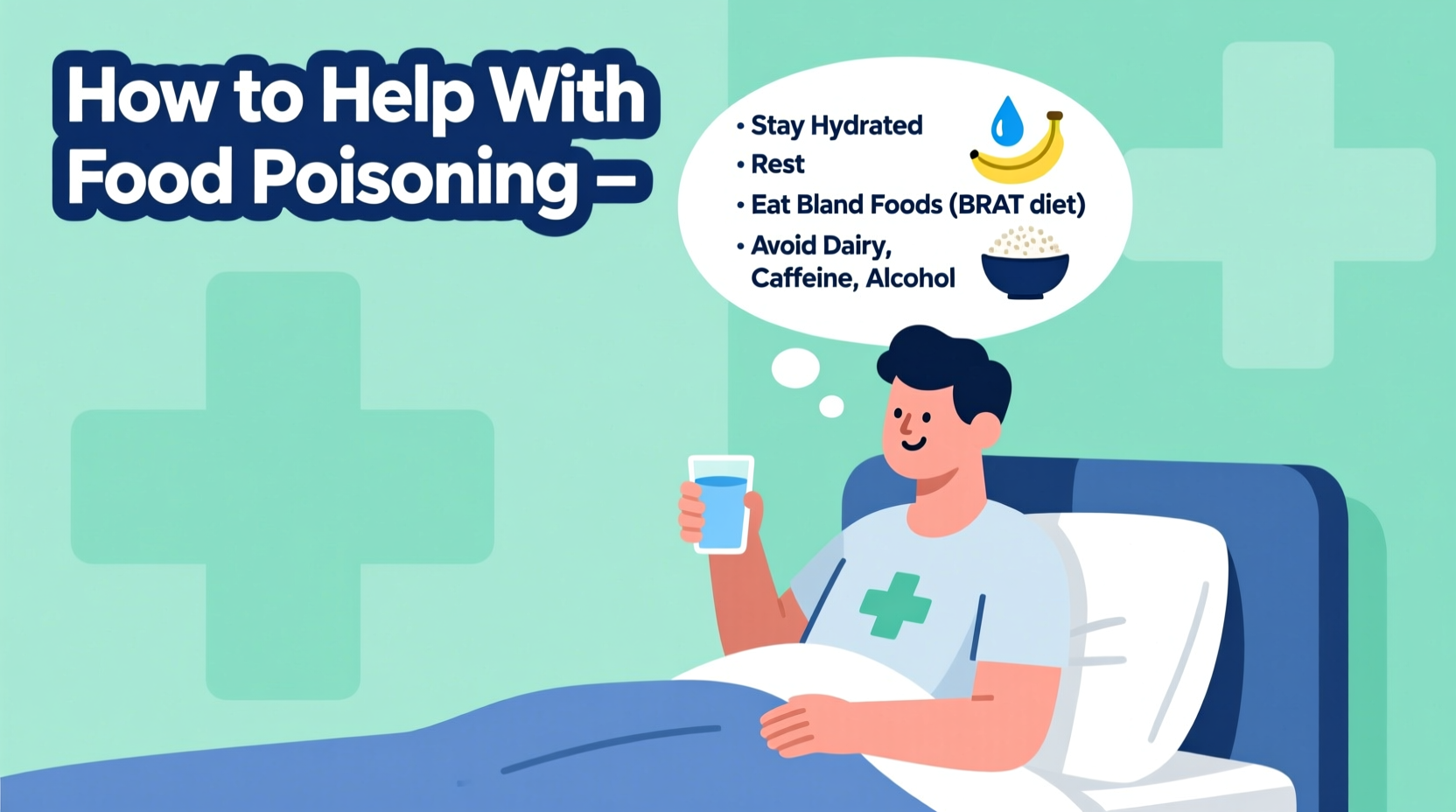What to Do Right Now: First 30 Minutes of Food Poisoning
When food poisoning strikes, your immediate actions determine recovery speed. Start with these critical steps:
- Sip small amounts of clear fluids - Take 1-2 tablespoons of oral rehydration solution every 5-10 minutes
- Stop eating completely for the first 4-6 hours to let your stomach rest
- Position yourself safely - Sit upright or lie on your side to prevent choking if vomiting occurs
- Remove potential hazards - Clear away sharp objects if experiencing severe dizziness
Recognizing Food Poisoning: Timeline of Symptoms
Understanding when symptoms typically appear helps identify the contaminated food source. The Centers for Disease Control and Prevention (CDC) notes that symptom onset varies by pathogen:
| Pathogen Type | Typical Onset Time | Common Sources |
|---|---|---|
| Bacterial (Salmonella, E. coli) | 6-48 hours | Undercooked poultry, eggs, raw produce |
| Viral (Norovirus) | 12-48 hours | Contaminated water, ready-to-eat foods |
| Parasitic | 1-3 weeks | Undercooked meat, contaminated water |
| Chemical toxins | 30 minutes-6 hours | Improperly stored cooked rice, canned goods |
Source: CDC Foodborne Diseases
Hydration Protocol: Your Most Critical Recovery Step
Dehydration causes most food poisoning complications. The World Health Organization recommends oral rehydration solutions (ORS) over plain water because they contain the precise balance of salts and sugars your body needs.
Effective hydration strategy:
- Start with 1-2 tablespoons of ORS every 5-10 minutes
- Gradually increase to 1/4 cup every 15-20 minutes as tolerated
- Continue for 24-48 hours after vomiting stops
- Monitor urine color - aim for pale yellow
Homemade ORS recipe: Mix 6 level teaspoons sugar + 1/2 teaspoon salt in 1 liter (4 cups) of clean water. Commercial ORS products like Pedialyte provide optimal electrolyte balance.

What NOT to Do During Food Poisoning
Certain common remedies can worsen your condition:
- Avoid anti-diarrheal medications initially - They can trap harmful bacteria in your system
- Don't drink sugary beverages - Sodas and fruit juices can worsen diarrhea
- Never take antibiotics without medical supervision - They're ineffective against viral causes
- Don't eat solid foods too soon - Wait until vomiting has stopped for 6+ hours
Recovery Timeline and Dietary Progression
Most healthy adults recover from food poisoning within 1-3 days. Follow this evidence-based progression:
First 6-24 Hours
Liquid-only phase: Focus exclusively on oral rehydration solutions. Sip small amounts frequently rather than drinking large quantities at once.
Days 1-2
Introduce bland foods using the BRAT diet (Bananas, Rice, Applesauce, Toast). These low-fiber foods are gentle on your digestive system. Add boiled potatoes and crackers as tolerated.
Days 3-5
Gradually reintroduce lean proteins (boiled chicken, eggs) and cooked vegetables. Avoid dairy, fatty foods, and spicy dishes until fully recovered.
When to Seek Immediate Medical Attention
While most cases resolve at home, certain symptoms require professional care. Contact a healthcare provider immediately if you experience:
- Bloody or black stools
- Diarrhea lasting more than 2 days
- Vomiting for more than 24 hours
- Signs of severe dehydration (dizziness, rapid heartbeat, little/no urination)
- Fever above 101.5°F (38.6°C)
- Numbness or tingling in extremities
High-risk groups including infants, elderly adults, pregnant women, and immunocompromised individuals should seek medical advice sooner. The Mayo Clinic emphasizes that these populations can deteriorate rapidly without proper intervention.
Preventing Future Episodes: Food Safety Essentials
Understanding the temperature danger zone (40°F-140°F or 4°C-60°C) prevents most food poisoning cases. Follow these evidence-based practices:
- Refrigerate leftovers within 2 hours (1 hour if above 90°F/32°C)
- Cook poultry to 165°F (74°C), ground meats to 160°F (71°C)
- Wash hands thoroughly before handling food and after using bathroom
- Use separate cutting boards for raw meats and produce
- Never thaw food at room temperature
Source: FDA Food Safety Guidelines
Food Poisoning Recovery: Common Questions
How long does food poisoning typically last?
Most cases of food poisoning resolve within 1-3 days. Bacterial infections like salmonella may last 4-7 days, while viral causes like norovirus typically resolve in 1-3 days. Severe cases or those affecting high-risk individuals may require longer recovery periods.
Can I take anti-diarrheal medication for food poisoning?
Avoid anti-diarrheal medications during the first 24-48 hours of food poisoning. These medications can prevent your body from eliminating harmful bacteria. After the acute phase passes and diarrhea becomes less severe, medications like loperamide may help, but consult a healthcare provider first if symptoms persist.
What's the best thing to drink when you have food poisoning?
Oral rehydration solutions (ORS) are most effective for replacing lost fluids and electrolytes. If unavailable, make a homemade solution with 6 teaspoons sugar, 1/2 teaspoon salt in 1 liter of clean water. Avoid plain water alone, as it doesn't replace lost electrolytes. Small, frequent sips work better than large amounts at once.
When should I go to the hospital for food poisoning?
Seek immediate medical attention if you experience bloody stools, high fever (over 101.5°F), signs of severe dehydration (dizziness, rapid heartbeat, little/no urination), vomiting for more than 24 hours, or neurological symptoms like blurred vision. Infants, elderly adults, pregnant women, and immunocompromised individuals should seek care sooner.
Can food poisoning be prevented?
Yes, most food poisoning cases are preventable through proper food handling. Key prevention strategies include cooking foods to proper temperatures, refrigerating leftovers promptly, washing hands thoroughly, using separate cutting boards for raw meats, and avoiding the temperature danger zone (40°F-140°F). The CDC estimates proper food handling prevents millions of cases annually.











 浙公网安备
33010002000092号
浙公网安备
33010002000092号 浙B2-20120091-4
浙B2-20120091-4